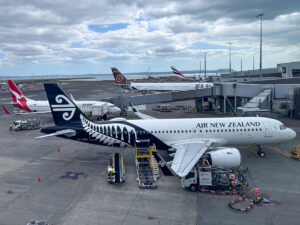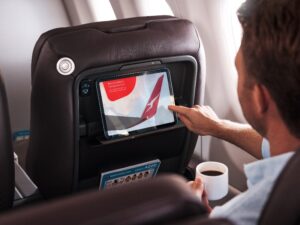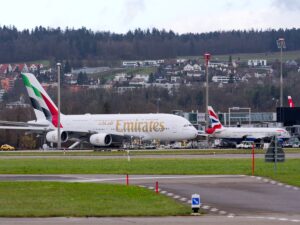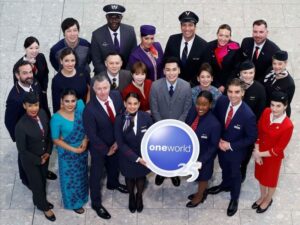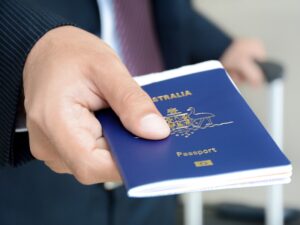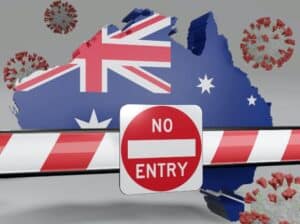
The short answer is that we don’t know yet. The long answer is that it will likely depend on when vaccines are rolled out, and whether the vaccines can prevent people from spreading infection in addition to preventing COVID-19 disease. Current estimates are that international travel could resume in the second half of 2021, but it’s still anyone’s guess.
Over the past week, the Pfizer/BioNTech vaccine began to be rolled out in the UK. That’s excellent news, although it doesn’t mean the pandemic is over just yet. The vaccine is not yet approved in Australia, and even if it is approved, it will take some time to vaccinate the majority of the population. Vulnerable Australians including health care workers and aged care residents would be given priority, so the rest of us will have to be patient.
At this point, the Australian government believes it will be on track to start rolling out a COVID-19 vaccine in March 2021, with “completion of the whole population by the end of 2021”.
The government has not yet decided whether it will immediately allow vaccinated Australians to enter or leave the country, because more research is needed on how exactly the vaccines will work.
Preventing COVID-19 disease vs infection
Following the final National Cabinet meeting for 2020, Department of Health Secretary Professor Brendan Murphy said that we still don’t know whether the vaccines would completely prevent transmission of the virus.
“The vaccines can prevent disease – we know that very clearly,” Professor Murphy said. “The extension to which they will effectively prevent, for example, asymptomatic transmission or people bringing the virus with them when they travel, we still have to find out.
“So this is an evolving place and there may well come a time when we have evidence that vaccines are very good at preventing people contracting the infection. In that circumstance it may be appropriate to allow quarantine-free travel.”
Asked when regular international travel to Australia may be able to resume, Professor Murphy told reporters “I think over the course of the next calendar year, as we get more and more information on more and more vaccines, we’ll have a much clearer picture.”
Dr Kristy Short, a virologist from the University of Queensland, explained the difference between the prevention of disease and infection, and the implications for allowing international travel on a recent episode of the ABC’s coronacast podcast.
Until a vaccine is available, the current hotel quarantine arrangements for international arrivals into Australia are likely to remain in place.
Will COVID-19 vaccination be required for international travel?
Although it is yet to be decided, the Australian government has signalled that once a vaccine is widely available, it may require international passengers arriving in Australia to present proof of COVID-19 vaccination or be forced into hotel quarantine.
This is not unprecedented – Australia and many other countries already require travellers to produce a yellow fever vaccination certificate if they have recently been in an affected area. That’s why passengers arriving in Australia are asked if they have been in Africa, the Carribean, Central or South America during the past six days (the incubation period for yellow fever).
Qantas has also indicated that it may require passengers on its international flights to be vaccinated against COVID-19 once safe, effective vaccines are widely available. Following criticism from some people, Qantas recently clarified its position:
The Qantas Group acknowledges some people have concerns regarding vaccines. However, we believe we have a duty of care to everyone on board our aircraft to create a safe environment. All our policies are ultimately shaped by this.
We don’t intend to formalise the detail of our vaccine requirement (including how long it might apply for) until a safe and effective one is well-established; and only then once international travel from Australia is ready to restart in earnest, which we are estimating will be between the middle-to-end of 2021.
What about quarantine-free travel bubbles?
While we wait for the approval and rollout of COVID-19 vaccines, there has been plenty of talk about restarting quarantine-free “travel bubbles” between countries with very low case numbers. So far, these travel bubbles have remained largely elusive. But New Zealand now appears to have agreed “in principle” to launching a travel bubble with Australia.
Earlier this year, there was talk of launching a two-way “trans-Tasman bubble” between Australia and New Zealand as early as July 2020. This was then pushed back to September, and now in December there’s still no bubble in place.
Most Australian states – which now include Queensland – already welcome one-way quarantine-free arrivals from New Zealand. New Zealand is yet to reciprocate, but NZ Prime Minister Jacinda Ardern has suggested a starting date could be announced in early 2021 if Australia continues to avoid further outbreaks of the virus.
The New Zealand government has just announced it will commence a travel bubble between New Zealand and the Cook Islands from early next year. The Cook Islands is free of COVID-19. But The New Zealand Herald reported recently that the NZ government is not considering starting a trans-Tasman bubble until at least February 2021.
Ultimately, travel bubbles can only work if both countries are prepared to accept the risk of an outbreak at the other end of the “bubble” and can agree on the definition of a hotspot. Otherwise, Australians could become stranded in New Zealand – or vice versa – because a small outbreak in one of the countries causes borders to close again at short notice.
The launch of a “world first” air travel bubble between Singapore and Hong Kong was suspended last month after a COVID-19 outbreak in Hong Kong.
Uncertainty remains for now
As 2020 draws to a close, we can rejoice that most internal Australian state and territory borders have now reopened. The final border, from South Australia to Western Australia, is due to open on Christmas Day if there are no further community transmission cases in South Australia until then.
But there are unfortunately still many unknowns when it comes to international travel. The government’s desire to bring stranded Australians home by Christmas will also not be fulfilled, with 38,655 Australians still registered with DFAT as trying to return home as of 11 December 2020 – and there are many more who have not registered. This number continues to increase, not decrease.
For now, we’ll just have to remain patient and listen to the health experts. But once vaccines are rolled out, the international travel situation will almost certainly improve. The current international travel restrictions will not last forever. At this stage, it looks like regular international flights to Australia could resume in the second half of 2021 – although a lot could happen between now and then.
Join the discussion on the Australian Frequent Flyer forum: Predictions of when international flights may resume/bans lifted
